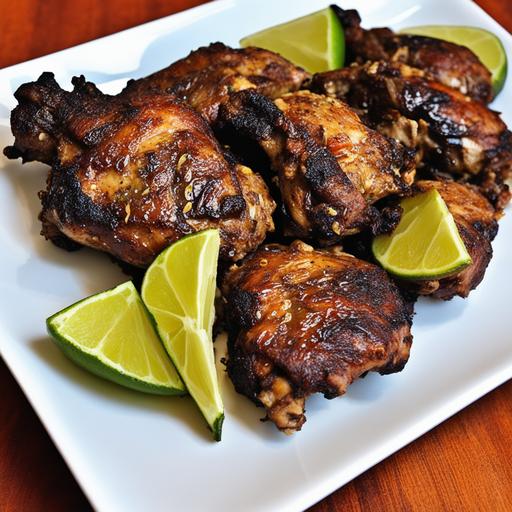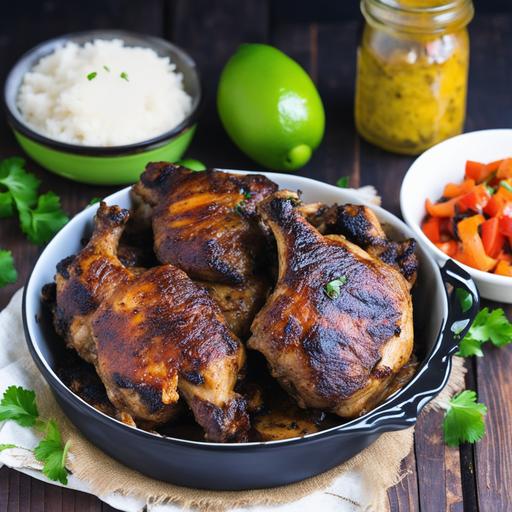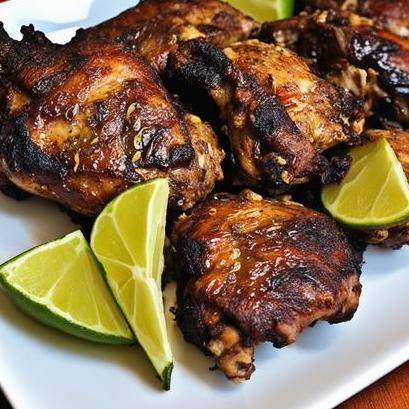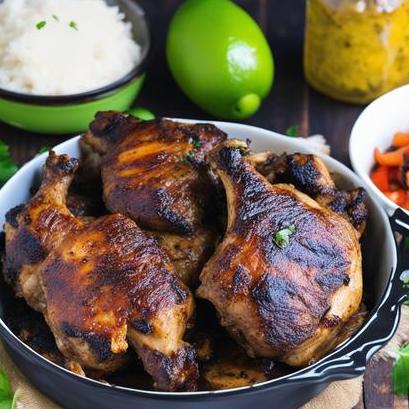
The Best Jerk Chicken Oven Recipe: A Finger-Licking Delight!
Jerk chicken is a tantalizing dish with its roots in Jamaican cuisine. The flavors are bold, the heat is intense, and the aroma is irresistible. While traditionally cooked over an open flame, we’ll be exploring an equally delicious oven recipe that allows you to indulge in this mouthwatering dish from the comfort of your own home. In this comprehensive guide, we’ll dive into the food science behind jerk chicken, culinary details, selection, cleaning, preparation, tips, variations, doneness checks, and everything else you need to know. Get ready to embark on a flavorful journey that will leave you craving for more!
Understanding the Food Science and Culinary Details
To truly appreciate the artistry behind jerk chicken, it’s essential to understand the food science and culinary details that make this dish so exceptional. The primary element that gives jerk chicken its distinctive flavor is the marinade or jerk paste it’s coated in. This paste typically includes a combination of scotch bonnet peppers, allspice berries, thyme, garlic, ginger, scallions, nutmeg, cinnamon, soy sauce, vinegar, and sometimes brown sugar.
The spice, heat, and aroma of jerk chicken depend on the marinade’s ingredients and the technique used to apply it. Marinating the chicken for an extended period intensifies the flavors, allowing the spices and other ingredients to penetrate the meat fully. The longer the chicken is marinated, the more pronounced and delightful its flavors become.
Selecting and Cleaning the Chicken
Choosing the right chicken for your jerk chicken recipe is crucial to ensure a delicious outcome. Opting for bone-in chicken thighs or drumsticks is ideal as they remain juicy and tender during the cooking process. These cuts also provide ample surface area to absorb the flavors of the jerk marinade.
When selecting chicken, look for fresh cuts with firm flesh and no foul odor. Organic, free-range chicken is often preferred due to its natural flavor and enhanced texture. Once you have your chicken, it’s essential to clean it thoroughly before marinating. Rinse the chicken under cold water, pat it dry with paper towels, and place it in a clean bowl ready for the next step.
Preparing the Jerk Marinade

Now that your chicken is clean and ready, it’s time to prepare the jerk marinade. This step is where the magic truly begins! To create an authentic jerk paste, gather the following ingredients:
-
6 scotch bonnet peppers (seeds removed for milder heat)
-
2 tablespoons of allspice berries
-
4-5 sprigs of fresh thyme
-
4 cloves of garlic
-
2 inches of fresh ginger
-
4 scallions (roughly chopped)
-
1 teaspoon of ground nutmeg
-
1 teaspoon of ground cinnamon
-
4 tablespoons of soy sauce
-
2 tablespoons of vinegar (apple cider or white vinegar)
-
1 tablespoon of brown sugar (optional for a touch of sweetness)
Using a blender or food processor, combine all the ingredients until you achieve a smooth and vibrant paste. Be cautious when handling scotch bonnet peppers, as they are incredibly hot and can cause skin and eye irritation. Make sure to wash your hands thoroughly after handling them or consider wearing gloves.
Tips for Creating the Perfect Jerk Chicken

Now that your jerk marinade is ready, it’s time to dive into some invaluable tips for creating the perfect jerk chicken.
Tip 1: Marinating Time
For an explosion of flavors, it is highly recommended to marinate the chicken for a minimum of 4 hours, preferably overnight. This ample marinating time allows the spices and other ingredients to infuse deeply into the meat, resulting in an unbeatable taste.
Tip 2: Adjusting Heat Levels
Jerk chicken is renowned for its fiery kick. However, if you prefer a milder heat, you can adjust the amount of scotch bonnet peppers or remove the seeds from the peppers before blending. Keep in mind that scotch bonnet peppers provide a unique flavor, so it’s generally recommended to include at least a few for an authentic jerk experience.
Tip 3: Basting Technique
Basting the chicken during the cooking process is essential to maintain moisture and enhance the flavors. With a basting brush or spoon, generously coat the chicken with the jerk marinade every 15-20 minutes, ensuring the flavors are locked in and beautifully caramelized.
Tip 4: Smoking Chips
If you’re longing for that traditional smokey flavor, consider adding soaked wood chips to a foil packet and placing it on the oven’s heating element or burner. These smoking chips will infuse your chicken, replicating the authentic jerk experience even without a grill.
The Oven Recipe: Step-by-Step Guide

Now that you’ve mastered the foundational aspects of jerk chicken, let’s delve into the oven recipe that will yield finger-licking results.
Step 1: Preheat your oven
Preheat your oven to 375°F (190°C). This temperature ensures the chicken cooks evenly while allowing the jerk marinade to caramelize and form a delectable crust.
Step 2: Arrange the chicken
Place the marinated chicken pieces on a wire rack set inside a baking sheet or roasting pan. The wire rack allows the heat to circulate evenly, resulting in crispy skin on all sides.
Step 3: Roasting
Carefully place the chicken in the preheated oven and let it cook for approximately 45-50 minutes, or until the internal temperature reaches 165°F (74°C). During the cooking process, continually baste the chicken every 15-20 minutes with the juices and marinade in the pan.
Step 4: Doneness Check
To ensure your chicken is cooked to perfection, pierce the thickest part of the meat with an instant-read thermometer. If it registers at least 165°F (74°C), the chicken is safe to eat. If not, return it to the oven for additional cooking time, checking at regular intervals.
Step 5: Rest and Serve
Once your chicken reaches the desired doneness, remove it from the oven and let it rest for a few minutes. This resting period helps retain the juices and ensures moist and tender meat. Serve your jerk chicken alongside some traditional sides, such as rice and peas, plantains, or a fresh salad, and enjoy this delightful Jamaican classic!
Overcooking and Undercooking: Challenges to Avoid

While the oven provides a controlled cooking environment, overcooking or undercooking jerk chicken can still be challenging. Here are some crucial points to avoid these pitfalls:
Overcooking
Overcooking jerk chicken can result in dry and tough meat, stripping it of its otherwise succulent flavors. To prevent overcooking, keep a close eye on your chicken, making sure not to exceed the recommended cooking time. Regular basting and using an instant-read thermometer to check for doneness will help you achieve perfectly cooked jerk chicken every time.
Undercooking
Undercooking can be equally problematic, jeopardizing your culinary masterpiece by presenting the risk of bacterial contamination. To ensure proper safety and taste, utilize the instant-read thermometer to confirm that the chicken’s internal temperature reaches the optimal 165°F (74°C).
Delicious Variations to Explore
Jerk chicken is a versatile dish that lends itself well to various interpretations. While the traditional recipe is fantastic, consider experimenting with these delicious variations:
-
Jerk Chicken Skewers: Thread marinated chicken pieces onto skewers, alternating with bell peppers or pineapple, and grill or broil them until charred and succulent.
-
Jerk Chicken Tacos: Shred jerk chicken and serve it in soft tortillas with a refreshing cilantro-lime slaw for a zesty and delightful taco experience.
-
Jerk Chicken Pizza: Spread a thin layer of jerk sauce on a pizza dough, add shredded jerk chicken, sliced onions, and bell peppers, and top it off with mozzarella cheese for a flavorful pizza twist.
In Conclusion
Jerk chicken is a dazzling dish that brings the vibrant flavors and heat of Jamaican cuisine straight to your kitchen. With this comprehensive oven recipe guide, you now possess the knowledge and techniques required to create jerk chicken that’s bursting with delightful flavors, tender textures, and tantalizing aromas. Make sure to select quality ingredients, marinate for optimum time, baste diligently, and don’t forget to indulge in possible variations for a culinary adventure like no other. So, roll up your sleeves, put on your chef’s hat, and get ready to savor the exceptional joy of homemade jerk chicken!
Sources
FAQS On Jerk Chicken Oven Recipe
How Long Should I Marinate The Chicken For The Best Flavor?
For the best results, marinate the chicken for at least 4 hours, or preferably overnight. This allows the flavors to really penetrate the meat, resulting in a more flavorful and succulent dish.
Can I Use Boneless, Skinless Chicken Breasts For Jerk Chicken?
While traditional jerk chicken is made with bone-in, skin-on chicken, you can absolutely use boneless, skinless chicken breasts. Just be mindful of cooking time, as they cook faster than bone-in chicken.
Do I Need To Preheat The Oven Before Cooking The Jerk Chicken?
Yes, it’s important to preheat your oven to 375°F (190°C) before cooking the jerk chicken. This ensures that the chicken cooks evenly and retains its juiciness.
Can I Make A Homemade Jerk Seasoning Blend?
Absolutely! If you don’t have store-bought jerk seasoning, you can easily make your own by combining spices like allspice, cinnamon, nutmeg, thyme, and cayenne pepper. There are plenty of recipes available online for homemade jerk seasoning.
Should I Baste The Jerk Chicken While It’s Cooking In The Oven?
Basting the chicken with the marinade or some olive oil halfway through cooking can help keep it moist and flavorful. Just be cautious not to open the oven too frequently, as this can cause the oven temperature to drop and affect the cooking process.


